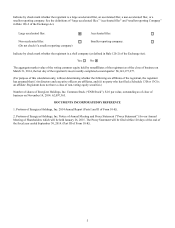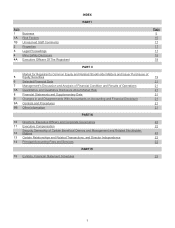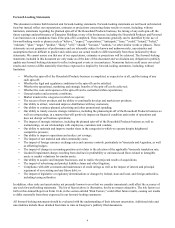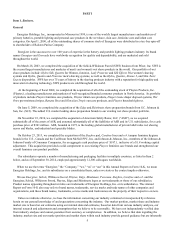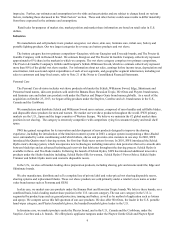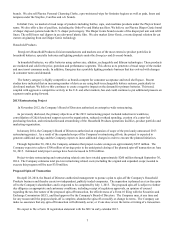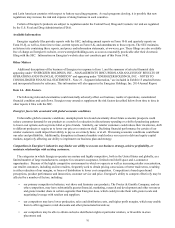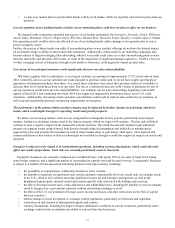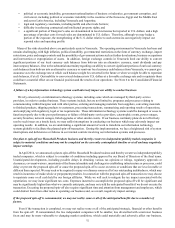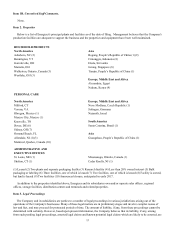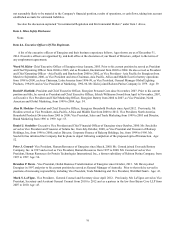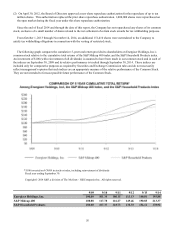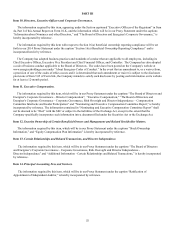Energizer 2014 Annual Report Download - page 16
Download and view the complete annual report
Please find page 16 of the 2014 Energizer annual report below. You can navigate through the pages in the report by either clicking on the pages listed below, or by using the keyword search tool below to find specific information within the annual report.• political or economic instability, government nationalization of business or industries, government corruption, and
civil unrest, including political or economic instability in the countries of the Eurozone, Egypt and the Middle East
and across Latin America, including Venezuela and Argentina;
• legal and regulatory constraints, including tariffs and other trade barriers;
• difficulty in enforcing contractual and intellectual property rights; and
• a significant portion of Energizer's sales are denominated in local currencies but reported in U.S. dollars, and a high
percentage of product costs for such sales are denominated in U.S. dollars. Therefore, although we may hedge a
portion of the exposure, the strengthening of the U.S. dollar relative to such currencies can negatively impact our
reported sales and operating profits.
Many of the risks described above are particularly acute in Venezuela. The operating environment in Venezuela has been and
remains challenging, with high inflation, political instability, governmental restrictions in the form of currency exchange, import
restrictions, price and margin controls and the possibility of government actions such as further devaluations, business occupations
and intervention or expropriation of assets. In addition, foreign exchange controls in Venezuela limit our ability to convert
significant portions of our local currency cash balances from bolivars into an alternative currency, remit dividends and pay
intercompany balances. Due to the substantial uncertainty regarding our ability to convert significant portions of our local currency
cash balances from bolivars into an alternative currency or remit our local currency cash balances from Venezuela, we cannot give
assurance as to the exchange rate at which such balances might be converted in the future or when we might be able to repatriate
such balances, if at all. Our inability to convert such balances into U.S. dollars at a favorable exchange rate and to repatriate them
could have a material effect on our financial position and the results of our operations. See Note 6 to the Consolidated Financial
Statements.
A failure of a key information technology system could adversely impact our ability to conduct business.
We rely extensively on information technology systems, including some which are managed by third-party service
providers, in order to conduct business. These systems include, but are not limited to, programs and processes relating to
communicating within Energizer and with other parties, ordering and managing materials from suppliers, converting materials
to finished products, shipping products to customers, processing transactions, summarizing and reporting results of operations,
and complying with regulatory, legal or tax requirements. These information technology systems could be damaged or cease to
function properly due to the poor performance or failure of third-party service providers, catastrophic events, power outages,
security breaches, network outages, failed upgrades or other similar events. If our business continuity plans do not effectively
resolve such issues on a timely basis, we may suffer interruptions in conducting our business which may adversely impact our
operating results. In addition, we are undertaking a significant amount of work to transform our information technology
systems globally to facilitate the planned spin-off transaction. During this implementation, we face a heightened risk of system
interruptions and deficiencies or failures in our internal controls involving our information systems and processes.
Our plan to spin-off our Household Products business and thereby create two independent publicly traded companies is
subject to material conditions and may not be completed on the currently contemplated timeline or at all and may negatively
impact earnings.
In April 2014, we announced a plan to spin-off the Household Products business and thereby create two independent publicly
traded companies, which is subject to a number of conditions including approval by our Board of Directors of the final terms.
Unanticipated developments, including possible delays in obtaining various tax opinions or rulings, regulatory approvals or
clearances, covenant waivers, uncertainty of the financial markets and challenges in establishing infrastructure or processes, could
delay or prevent the proposed spin-off or cause the proposed spin-off to occur on terms or conditions that are less favorable or
different than expected. We may seek or be required to repay or refinance some or all of our outstanding indebtedness, which may
result in incurrence of make-whole or prepayment penalties. In connection with the proposed spin-off transaction we may choose
to repatriate some or all cash held by our foreign affiliates. While we will seek to mitigate the tax impact associated with the
repatriation, we may incur significant tax costs. Expenses incurred to accomplish the proposed spin-off will be significant and
may be significantly higher than what we currently anticipate, and may not yield the anticipated benefits if we do not execute the
transaction. Executing the proposed spin-off also requires significant time and attention from management and employees, which
could distract them from other tasks in operating our business and, as a result, negatively impact earnings.
If the proposed spin-off is consummated, we may not realize some or all of the anticipated benefits due to a number of
factors.
Even if the transaction is completed, we may not realize some or all of the anticipated strategic, financial or other benefits
from the spin-off. If consummated, the two independent companies will be smaller, less diversified with a narrower business
focus and may be more vulnerable to changing market conditions, which could materially and adversely affect our business,
12


